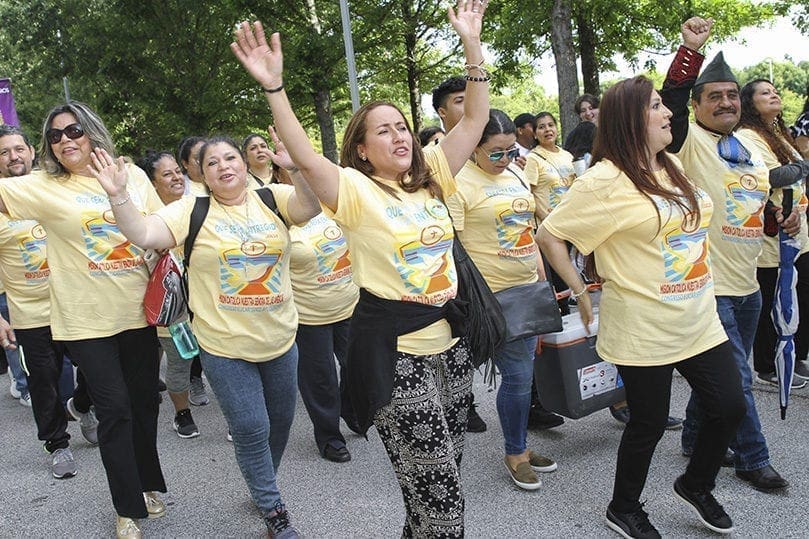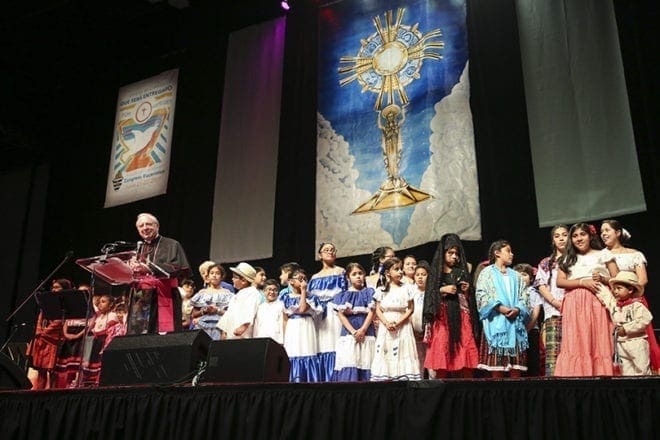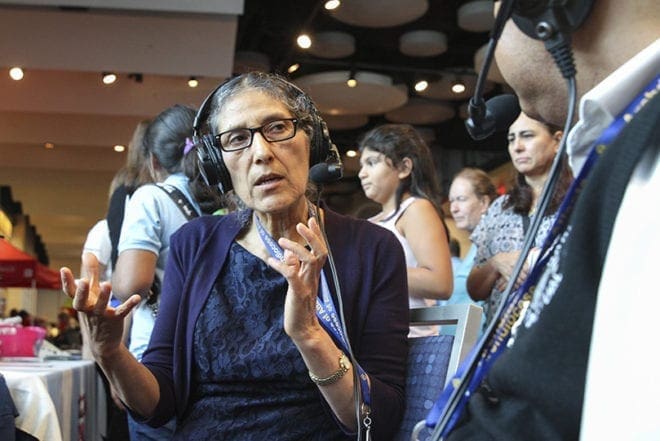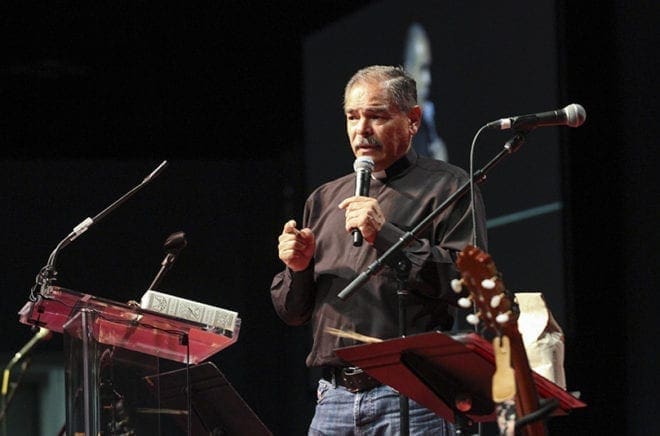 Photo By Michael Alexander
Photo By Michael AlexanderSpanish track offers Hispanic Catholics time to recharge spiritual batteries
By IMELDA RICHARD, Special to the Bulletin | Published July 11, 2019 | En Español
COLLEGE PARK—Early on Saturday, June 22, thousands of Catholics gathered at the Georgia International Convention Center to participate in the 2019 Eucharistic Congress. The sound of the drums and the choir of voices accompanied the different groups representing many parishes in the archdiocese, congregating for the morning procession.
Alfredo Aviles from St. Matthew Church in Winder is a member of the parish Aztec Dance group. In colorful and handmade Aztec-inspired headdresses and costumes, the members dance to honor Our Lady of Guadalupe. Aviles’ two daughters are members of the group as well.
“This is part of our culture and our faith traditions,” he said.
Sister Miriam Mendoza, director of religious education at the Cathedral of Christ the King Hispanic Mission, was expecting “about 100 parishioners” to join her in the procession. Osiel Guzman, a native of Mexico and a Christ the King parishioner, has been attending the congress for 10 years.
“This is a very important time of the year for me. We can feel the real presence of Christ in the Eucharist and we have the opportunity to learn so much about our faith and feed our souls,” said Guzman.
The Society of Peru’s Señor de los Milagros (Lord of Miracles) participated in the procession. The Lord of Miracles image inspires one of the largest religious processions in the world every October. The image depicts a crucified Jesus painted by an unknown African slave in 17th century Lima. Its name originated in the 18th century during an earthquake that destroyed most of the city, leaving only the mural standing. In Atlanta, the Lord of Miracles has found a home at Our Lady of the Americas Mission. Members of the society, donning traditional purple habits, waited to start the procession.
Following the joyous procession and adoration before the Blessed Sacrament, people dispersed to attend the different sessions offered at the congress.
At the Spanish track, Clara Richardson, a singer with SHEMA, invited all to start praising God in song. SHEMA is the music ministry created by former Atlanta Bishop Luis Zarama specifically for the Spanish track. Its members not only rehearse before the congress, but they also pray together and participate in a retreat to ask the Holy Spirit to guide them during the day.

Wearing the traditional dress of their respective family’s native country, children line the stage in the Spanish track after paying homage to Our Lady of Guadalupe with flowers. Bishop Joel M. Konzen, SM, left, called the children up by country. Photo By Michael Alexander
Yolanda Muñoz, assistant director for Hispanic and Latino Cultures at the Office of Intercultural Ministries, welcomed the crowd to the Spanish track and acted as the master of ceremonies.
“We Hispanics are now half of the Catholic population in the Archdiocese of Atlanta,” Muñoz announced.
She introduced the first speakers of the day, Bishop Joel Konzen, SM, and Bishop Bernard E. Shlesinger III.
“We will be having adoration very soon. The bishops and the most Blessed Sacrament! What a way to start the congress,” she said.
Remembering the Blessed Mother
Bishop Konzen reflected on the words of Our Lady of Guadalupe to Juan Diego—“Do not fear … am I not here, I who am your mother?”
“We must always keep these words close to our hearts, and always remember Mary is our mother,” Bishop Konzen said.
He introduced a group of children dressed in traditional attire representing all Latin American countries. Hispanic Catholics are devoted to the Virgin Mary and about 20 countries have canonically crowned and declared the Blessed Mother as their patroness. The children presented flowers to Our Lady while Bishop Konzen announced the country and the Marian title that represents each nation.
Father Desmond Drummer, pastor of Most Blessed Sacrament Church, brought the Blessed Sacrament into the track. The audience reverently fell on their knees, some moved to tears during adoration.
“It was a very special moment. There are no words to describe it,” said Mayra Gutierrez. She has attended the Congress with her family for the past 24 years.
Bishop Shlesinger asked the audience to pray for the seminarians and for vocations to the priesthood, especially in Atlanta.
“We need more priests to bring the Eucharist to the many Catholics in our archdiocese. Christ wants to live inside us,” said Bishop Shlesinger.
A group of five seminarians came to the stage and the bishop asked them to introduce themselves to the crowd, who welcomed each with joy and enthusiasm and a special blessing with hands extended.
Míller Gómez, a native from Colombia, was recently ordained as a transitional deacon and was one of the seminarians on stage.

During the Eucharistic Congress, June 22, Spanish track speaker Elena Segura sits for an interview with Genry Batista of Radio Inmaculada. Photo By Michael Alexander
“It was a very special and emotional moment. The prayers from the community are very important for priests and seminarians. I felt all the support from the community and to know that the people pray for us was very moving,” he said.
Rev. Mr. Gómez will complete his summer service at St. Catherine of Siena Church, Kennesaw, before returning to seminary.
One heart, one soul
The next speaker of the day was Father Jaime Molina. Born in Mexico, he was ordained into the priesthood in the Parish of Nuestra Señora de Guadalupe on Aug. 15, 1988. Since 1999, Father Molina has been serving with the Missionaries of La Salette at St. Thomas the Apostle Church, Smyrna.
Using grapes and wine, Father Molina emphasized the importance of forgetting our individualisms and becoming one heart, one soul at the service of God.
“You decide whether you want to remain a grape, or if you want to become wine. Just remember, the process to transform a grape into wine, is a painful one. The grape gets crushed and pressed—that has to be painful,” Father Molina said. “And just like that grape, we have to transform ourselves and become something better, like wine. We are all together in this like that bunch of grapes.”
Father Molina said that only in the Eucharist can we become authentic evangelizers.
“Every person that has a personal encounter with Christ has to become a witness and proclaim the Gospel with his or her life, especially to those who don’t know Christ yet.”
He spoke about the parable of the lost sheep in the Gospel of Matthew.
“Just like the shepherd who left his flock of 99 sheep to find the one that is lost, so we have to forget ourselves and go find those who are lost and need us,” he finished.
Muñoz announced the next speaker, EWTN’s “Nuestra Fe en Vivo” host José “Pepe” Alonso, and the audience rejoiced. Alonso was born in Mexico City. All of his education primarily was with the Jesuit priests. After more than 17 years and 560 episodes, his program continues to be one of the highest rated of EWTN’s programming.
He started his speech by asking, “How many of you want to serve the Lord?” Immediately almost every hand in the hall flew up.
“If you want to serve the Lord, then be prepared to be tested,” he said.
Alonso said that to be loved by God does not mean to be spoiled by him.
“If you think the Christian life is an easy one, you better pay attention to Christ’s life.”
He invited the crowd to reflect on the parable of the vine and the branches. In the Gospel of John Jesus says, “I am the vine, you are the branches. Whoever remains in me and I in him will bear much fruit, because without me you can do nothing.”
To remain in Christ is not an easy task, reminded Alonso.
“The vine will feed us in any way the vine wants, not the other way around. The vine grower will prune the vine for it to bear fruit. Be prepared to be pruned, be prepared to be tested. We need to go through the process of pruning,” he said. “It is a painful one, but it is necessary if we want to bear fruit. It is a painful one, but it is because of God’s love.”

Missionaries of Our Lady of La Salette Father Jamie Molina Juarez, a native of Mexico, was an afternoon presenter in the Hispanic track. Father Molina has served the Hispanic community at St. Thomas the Apostle Church, Smyrna, since 1999. Photo By Michael Alexander
In 2015, Alonso’s wife Elvira was diagnosed with leukemia. She died in 2017. He was very angry, because he had prayed “very hard” for her healing, and he thought the Lord did not hear his prayers. He said this anger lasted until he felt the Lord telling him that he had granted the miracle of giving his wife eternal life.
“We are called to bear fruit. The Lord wants to work in our lives and we have to let him do so. Let’s follow Mary’s example who said I am the Lord’s servant.”
The Eucharist is a kiss from God
The final speaker was Elena Segura, who began her career organizing grassroots responses to problems facing her community in rural Peru. Segura currently serves as the associate director of the Office of Human Dignity and as senior coordinator for immigration for the Archdiocese of Chicago.
“The baptism marks us as God’s children. Sometimes we forget who we are. Jesus reminds us to remain vigilant. When we are one with God, we can discern the truth … we walk in the light. We forget that in the baptism we become his children,” she said to the attentive audience. “In the Eucharist, Jesus is calling us with open arms, he gives us a kiss.”
As the senior coordinator for the immigration ministry, Segura has witnessed many heartbreaking stories. Through her experiences, she has learned “to talk to God as if I were talking to a friend.”
When she reflects on the challenges that the immigrant community faces, especially undocumented immigrants, she asks herself, “Weren’t the disciples on the road to Emmaus sad and afraid as well? … And who joined them on their journey? Jesus did. He walked with them and shared in their fears. This is our story now. Jesus is here with us.”
Muñoz continues to be amazed at the presence of the Hispanic community at the Congress.
“It gets bigger and bigger every year. They truly enjoy participating and they come with a spirit that is very contagious,” said Muñoz. “I would like to encourage everybody to come next year. We get to see the blessing of the diversity in our church. We get to share our faith and our love for the Eucharist, as the one big Catholic family that we are. We walk out of there with our hearts filled with Christ’s love, and with our batteries recharged.”